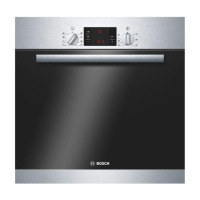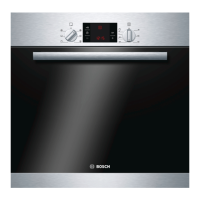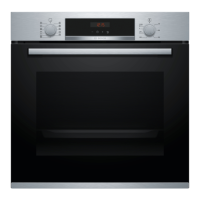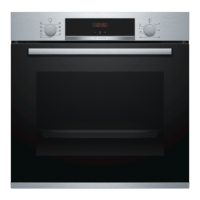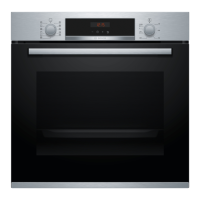14
Poultry
The weights of the table are for unstuffed birds ready to roast.
Place whole birds on the wire shelf initially with the breast side
down. Turn once after
Z the estimated time.
Turn pieces of meat such as turkey pieces or turkey breasts
over after half the cooking time has elapsed. Turn the pieces of
poultry after
Z the time has elapsed.
If cooking duck or goose, prick the skin below the wings to
release the fat.
The birds can be made brown and crunchy if they are smeared
with butter, brine or orange juice more or less at the end of
cooking time.
If grilling directly on the shelf, place the enamel tray on level 1.
Fish
Turn the fish pieces after
Z the time has elapsed.
Whole fish do not need to be turned over. Bake whole fish in
swimming position with the dorsal fin up. So that the fish
remains stable, place a cut potato or a small container suitable
for baking into the abdomen of the fish.
To cook fish fillets, add a few tablespoons of liquid when
cooking.
If grilling directly on the shelf, place the enamel tray on level 1.
Tips for roasting and grilling
Roast veal 1.0 kg uncovered 2
%
190-210 100
2.0 kg 2
%
170-190 120
Boned leg of lamb 1.5 kg uncovered 1
7
150-170 110
Meat Weight Cookware Level Type of heating Temperature
at °C, grill
power
Cooking time,
minutes
Poultry Weight Cookware Level Type of heating Temperature
in °C
Cooking time,
minutes
Chicken halves, 1 to 4 portions 400 g each Shelf 2
7
200-220 40-50
Chicken pieces 250 g each Shelf 2
7
200-220 30-40
Chicken, whole 1 to 4 birds 1.0 kg each Shelf 2
7
190-210 50-80
Duck 1.7 kg Shelf 2
7
180-200 90-100
Goose 3.0 kg Shelf 2
7
170-190 110-130
Young turkey 3.0 kg Shelf 2
7
180-200 80-100
2 turkey legs 800 g each Shelf 2
7
190-210 90-110
Fish Weight Cookware Level Type of heating Temperature
at °C, grill
power
Cooking
time, min-
utes
Grilled fish 300 g Shelf 3
(
2 20-25
1.0 kg 2
7
180-200 45-50
1.5 kg 2
7
170-190 50-60
Fish slices 300 g each Shelf 4
(
2 20-25
The table does not contain information
for the weight of the joint.
Select the next lowest weight from the instructions and extend the time.
How to tell when the roast is ready. Use a meat thermometer (available from specialist shops) or carry out a “spoon test”.
Press down on the roast with a spoon. If it feels firm, it is ready. If the spoon can be
pressed in, it needs to be cooked for a little longer.
The roast is too dark and the crackling
is partly burnt.
Check the shelf height and temperature.
The roast looks good but the juices are
burnt.
Next time, use a smaller roasting dish or add more liquid.
The roast looks good but the juices are
too clear and watery.
Next time, use a larger roasting dish and use less liquid.
Steam rises from the roast when basted. This is normal and due to the laws of physics. The majority of the steam escapes through
the steam outlet. It may settle and form condensation on the cooler switch panel or on
the fronts of adjacent units.

